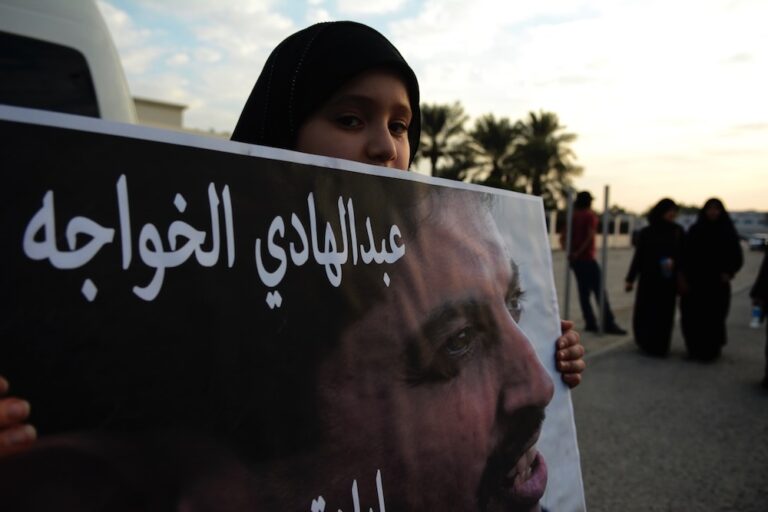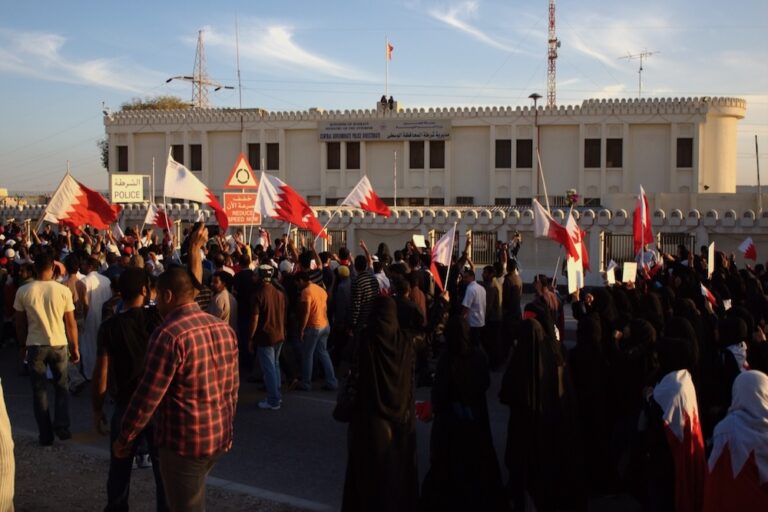Earlier in 2011, universities dismissed faculty and staff and expelled students for expressing critical opinions or attending overwhelmingly peaceful demonstrations.
(Human Rights Watch/IFEX) – New York, September 24, 2011 – Universities in Bahrain should immediately reinstate all students, faculty, and staff who were dismissed solely for expressing opinions critical of the government and ruling family or attending overwhelmingly peaceful anti-government demonstrations in February and March of this year, Human Rights Watch said today. Human Rights Watch also called on the University of Bahrain to stop requiring students to sign oaths of loyalty to the ruling Al Khalifa family and the government as a condition for enrollment.
The University of Bahrain, the country’s largest higher education institution, dismissed at least 100 faculty and staff between April and August, in most cases for attending anti-government demonstrations or posting links on social media, Human Rights Watch said. Since May, university staff and, in some cases, Education Ministry officials or police have interrogated hundreds of students, and more than 500 were suspended for a semester or expelled. The new semester begins September 25, 2011.
“Bahraini authorities have punished students and professors – along with thousands of other Bahrainis – simply for exercising their right to criticize the government,” said Joe Stork, deputy Middle East director at Human Rights Watch. “Attacking students and professors who dare to dissent flagrantly violates their right to freedom of opinion and expression.”
In mid-May, masked security forces conducted pre-dawn arrest raids on the homes of a number of university faculty, holding them for several hours before releasing them without charge. Detained faculty members told Human Rights Watch that Interior Ministry interrogators appeared to have transcripts of their earlier interrogations by a university disciplinary committee. In all, security forces detained and questioned at least 15 professors from three universities, and held one in custody for more than four months.
One professor, who does not consider himself politically active, said, “One day, the Crown Prince appeared on TV and seemed to welcome the opposition marches. It was like the green light to silent people, like me, to participate without any expected punishment from the government. As a result, I took part in a march at the university organized by some students. Unfortunately I was wrong and the whole story was like a trap.” University administrators accused him of participating in an illegal march inside the university campus, chanting anti-government slogans, abusing the symbols of the Kingdom of Bahrain, and breaching his duties. They fired him in August.
On August 27, government and university officials announced that 470 expelled students would be allowed to return, but would have to retake the spring semester. At least 60 students at the University of Bahrain and Bahrain Polytechnic remain expelled and the permanent records of hundreds of others are marred by their suspension for unspecified “disciplinary” reasons. Both universities are public institutions.
More than 30 students and 20 professors who spoke with Human Rights Watch said that university students, faculty, and staff continue to face harassment, intimidation, and dismissal or loss of scholarships in retaliation for their support of pro-democracy public demonstrations.
Beginning in May, the University of Bahrain required all students to sign loyalty oaths to the government and ruling family as a condition of their continued enrollment. The pledge states that the signer will extend “complete loyalty to the leadership of the Kingdom of Bahrain, represented by His Majesty King Hamad bin Isa Al Khalifa” and obliges students “not to organize or participate in any activity within the campus or outside that is irrelevant to student and academic affairs and authorized research.”
University of Bahrain students who have now been reinstated told Human Rights Watch that they fear they will be required to sign a similar pledge before resuming their studies on September 25.
Punishment of students and professors for exercising their right to free expression and assembly violates international and Bahraini law. The International Covenant on Civil and Political Rights (ICCPR), which Bahrain ratified in 2006, guarantees freedom of expression and peaceful assembly. Bahrain’s Law No. 27 of 2005 on education calls for “developing awareness of principles of human rights” and “the right of free expression” in education, acknowledging the importance of free expression standards to academic freedom.
“Punishing dissenting comments and ideas badly undermines academic freedom, which is all about the right to free expression and freedom of opinion,” Stork said. “Bahraini universities should reinstate all professors and students dismissed for so-called crimes of expression immediately, and rescind all use of political loyalty oaths.”
Dismissed students and professors told Human Rights Watch that they had informed the Bahrain Independent Commission of Inquiry, which is investigating human rights violations in connection with the political unrest in the country, about their cases. One former architecture student at the University of Bahrain said, “We have the right to education and the right to express our opinion and the freedom of speech. We will not give up either of these rights for the other. We want both.”


